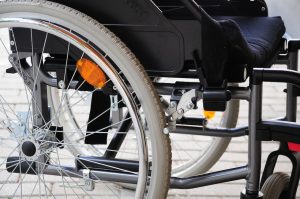If you’re mobility impaired or know someone who is, you may have wondered how airlines get passengers to and from the airplane door using wheelchairs and electric carts. The intricate web of logistics that makes it all happen is quite impressive.
According to the Air Carrier Access Act of 1986, airlines are prohibited from discriminating against passengers with disabilities. They offer many services including designated websites, telephone contact centers, and kiosks (mandated by the Department of Transportation), but it takes some extra work to dig up all that is available.
Sometimes thing do go amiss. Peak demand can lead to delays. If you ever encounter problems accessing these services, contact the airline as soon as possible (social media is a great option if you’re mid-travel).
Many large hub airports have electric carts that travel the concourses and shuttle those that need assistance between gates, beeping and honking at you as you trudge from gate to gate. This service can be requested when making a reservation, although many airports simply use wheelchairs. For example, Charlotte Douglas International Airport is planning to do away with electric carts because of too much congestion.
How to reserve special assistance
It all begins with the reservation. You can book extra assistance online or via dedicated airline phone numbers for travelers with disabilities. Even if it is something requested at the time of reservation, it is always crucial to verify that it has been booked on all further segments in your journey, especially if you booked through a third-party website or a travel agent.
Below are links to the services provided by major domestic airlines:
Protocol on when to request and how much to tip
According to Candy Harrington, editor of Emerging Horizons and an expert on traveling with disabilities, you should always tip if you use the services of a wheelchair attendant or an electric cart in the airport.
She recommends tipping about $5 to someone wheeling you through the airport, especially if they helped with luggage. They deserve a tip in the same way that you might tip a bellman or shuttle driver. She adds that if an airline employee pushes the wheelchair, it is not expected to tip; more often, however, it is a third-party service, whose employees are paid less, that provides assistance.
This is the reason for such high turnover in this airport role, and it has even led to the threat of strikes from unhappy employees such as those in Chicago O’Hare recently.
Harrington adds that it is acceptable to request a wheelchair even if you do not use one at home, but still have some mobility issues. Many airports require long walks and if have a tight connection, this could be the difference between making or missing a flight. It is also acceptable to ask the wheelchair assistant to help with your luggage or even stop so you can pick up food or coffee to go, but again that should be considered when tipping.
She also suggests that you ask to keep the wheelchair even if the person that pushed you has to leave. Typically, an airline employee can push you down the jet bridge. In the event of a gate change or lengthy delay, you might have to make a long trek to another area, and giving up the wheelchair before boarding might be inconvenient.
Also keep in mind that If you need to use the restroom, the “assistance” ends at the door to the restroom, meaning do not expect further help once inside.
Harrington points to the growing number of Baby Boomers and older travelers that are asking for assistance that may lead to potential delays. Always be prepared with a plan B in case there are not enough attendants to help during a brief connection.
Minneapolis/St. Paul airport is trialing its own premium paid program that guarantees wheelchair assistance from curb to gate or gate to gate for a fee. It’s a great idea for those worried about getting around the airport; let’s hope the service expands to other airports.






